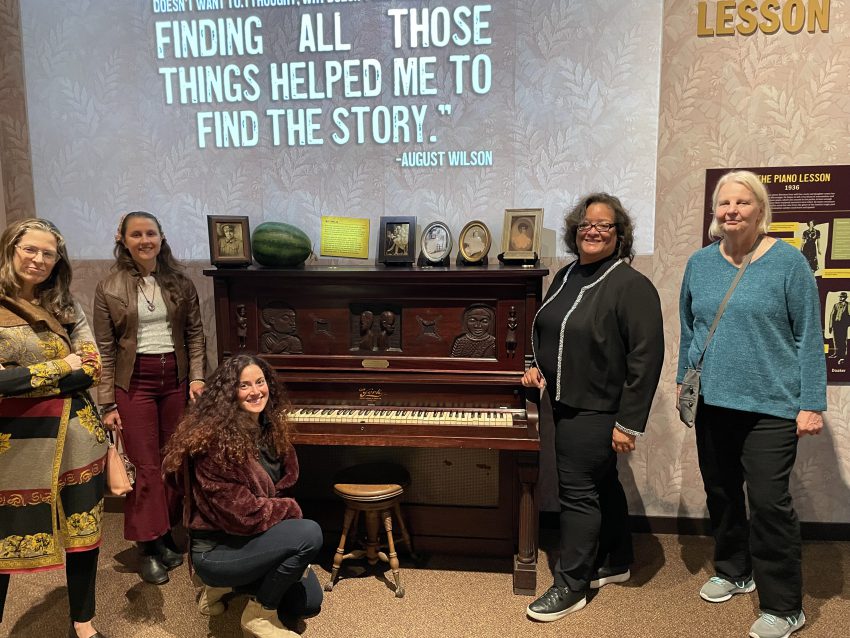PTS Associate Professor of Old Testament Dr. Kimberly Russaw teaches her students the importance of context in biblical studies, using modern examples of similar work. She reflects on a recent lesson she used in her introductory Old Testament course.
As a professor, I am always interested in how I can help my students foreground context as they connect their work in the biblical studies classroom with their Pittsburgh community. This semester, as part of the introductory Genesis through Esther class I’m teaching, I used August Wilson’s play The Piano Lesson to help students further appreciate the importance of context—especially in biblical studies. After reading and discussing The Piano Lesson in class, and online using the Flip discussion board technology, students were encouraged to visit the “August Wilson: The Writer’s Landscape” exhibit at the August Wilson African American Cultural Center (AWAACC) in Pittsburgh. The museum exhibit highlights three essential elements of Wilson’s context: the local diner where he would observe patrons, his private office where he would write and listen to music, and the Hill District in Pittsburgh where he grew up.
Though the exhibit is designed to be self-guided, Cathryn Calhoun, AWAACC director of education and community engagement, made sure the class had our own tour guide for the evening. Our guide was able to further situate Wilson and his work for us, as well as answer our many questions as students made connections between the importance of context for Wilson, his work, the writers of the biblical text, and the text itself.
My overarching objective for this learning experience is that students would bring their growing knowledge of the ancient context of the biblical writers to an encounter with a modern writer and begin to formulate ways to translate a new understanding of the importance of context to their ministry environments. This year’s group of students did not disappoint. The day after visiting the museum exhibit, students spent time debriefing the experience. Their connections demonstrated their growing ability to synthesize their work in the seminary classroom with the city where they minister.
The picture above shows me with PTS students Deborah Hickey, Jennifer Karius, Alyssa Lukach, and Christine Ulrich in the section of the exhibit dedicated to The Piano Lesson. We are pictured in front of the all-important piano!
Student Impact
Some of Dr. Russaw’s students were asked to reflect on the lesson and museum visit. Here are selected responses:
What do you appreciate about the way Dr. Russaw teaches biblical studies?
“I appreciate how Dr. Russaw challenges her students to analyze context, culture, and narrative goals in biblical interpretation. Comparing literary techniques used by biblical writers with those used by August Wilson has inspired me to continue engaging with texts that capture the essence of a culture with relatable characters as a way to empathize and expand my ability to identify key themes and stories as a method of ethnographic discovery.” Alyssa Lukach
“I appreciate the informality of the discussions, the look into areas of what was happening during the time in question from alternative points of view.” Deborah Hickey
“I appreciate the way Dr. Russaw begins class each time with a meditation. It truly does help me become centered before diving into sometimes very heavy topics. Her teaching style on the Old Testament has expanded my mind around the context as well as allowed me to improve my critical thinking around Old Testament literature.” Christine Ullrich
“Dr. Russaw’s class has fully challenged us to put ourselves in the position of someone from another culture. Given the overwhelming impact of the Bible on our lives and in the world today, this is precisely where the education system needs to go, in my humble view. Especially education feeding into our church cultures.” Jennifer Karius
What did you learn as a part of this lesson or trip?
“Learning more about August Wilson’s context as a writer, his unique background and his passion to learn about life and the realness of people was inspiring . . . . His goal was to portray the Black experience across generations in Pittsburgh. To connect his personal life experience and his method of working and writing to then see the fruit of his labor in his wonderful stories was truly a gift. This put it into perspective and proved that context is everything: just like Dr. Russaw always says.” Christine Ullrich
“I enjoyed the well thought out displays and narratives, the richness of the African American experience over the span of the hundred years the century cycle enveloped.” Deborah Hickey
“The museum trip was an immersive experience that taught me what it was like to be Black at the times his plays were written. What struck me in particular was how producers took financial advantage of popular Black artists and stole from them. Although we are being stretched academically in Dr. Russaw’s class, it’s that multi-modal approach that is helping me put myself in someone else’s shoes and is meaningful in terms of my faith and how I will speak of the Bible with others.” Jennifer Karius

